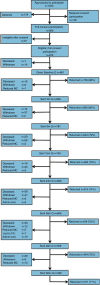Prevalence and determinants of depression up to 5 years after colorectal cancer surgery: results from the ColoREctal Wellbeing (CREW) study
- PMID: 34679253
- PMCID: PMC9298990
- DOI: 10.1111/codi.15949
Prevalence and determinants of depression up to 5 years after colorectal cancer surgery: results from the ColoREctal Wellbeing (CREW) study
Abstract
Aim: Depression experienced by people with colorectal cancer (CRC) is an important clinical problem affecting quality of life. Recognition of depression at key points in the pathway enables timely referral to support. This study aimed to examine depression before and 5 years after surgery to examine its prevalence and identify determinants.
Method: The ColoREctal Wellbeing (CREW) study is a prospective UK cohort study involving 872 adults with nonmetastatic CRC recruited before surgery with curative intent. Questionnaires completed before surgery and 3, 9, 15, 24, 36, 48 and 60 months after surgery captured socio-demographics and assessed depression (Centre for Epidemiologic Studies Depression Scale, CES-D) and other psychosocial factors. Clinical details were also gathered. We present the prevalence of clinically significant depression (CES-D ≥ 20) over time and its predictors assessed before and 2 years after surgery.
Results: Before surgery, 21.0% of the cohort reported CES-D ≥ 20 reducing to 14.7% 5 years after surgery. Presurgery risk factors predicting subsequent depression were clinically significant depression and anxiety, previous mental health service use, low self-efficacy, poor health, having neoadjuvant treatment and low social support. Postsurgery risk factors at 2 years predicting subsequent depression were clinically significant depression, negative affect, cognitive dysfunction, accommodation type and poor health.
Conclusion: Depression is highly pervasive in people with CRC, exceeding prevalence in the general population across follow-up. Our findings emphasize the need to screen and treat depression across the pathway. Our novel data highlight key risk factors of later depression at important and opportune time points: before surgery and at the end of routine surveillance. Early recognition and timely referral to appropriate support is vital to improve long-term psychological outcomes.
Keywords: colorectal cancer; depression; determinants; quality of life; risk factors.
© 2021 The Authors. Colorectal Disease published by John Wiley & Sons Ltd on behalf of Association of Coloproctology of Great Britain and Ireland.
Conflict of interest statement
LC has received an honorarium for teaching from Boehringer Ingelheim. DF has received an honorarium for teaching from Roche.
Figures

References
-
- World Health Organization . Depression and other common mental disorders: global health estimates, 2017.
Publication types
MeSH terms
Grants and funding
LinkOut - more resources
Full Text Sources
Medical

